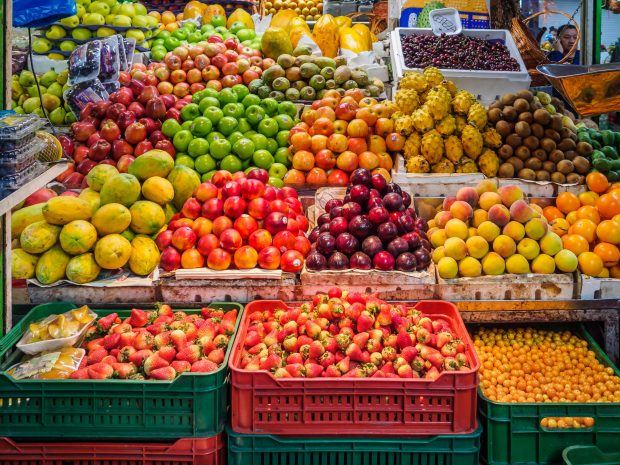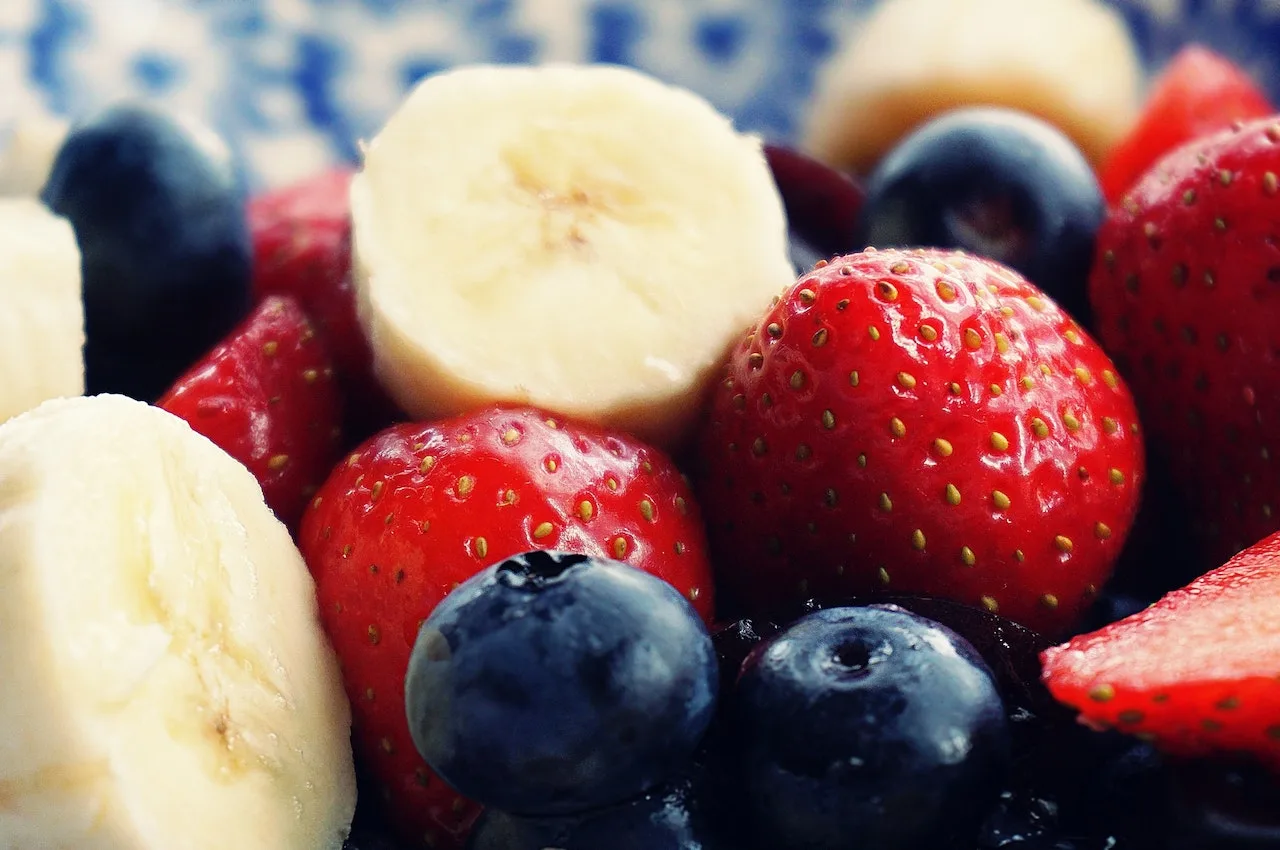Fruits are delicious, act as a source of natural sugars, and have a range of benefits for your health. According to a Harvard analysis, we should be consuming a total of five servings of fruit and vegetables a day. Research published in the journal Circulation indicates that those who adhered to this guideline showed a:
- 3% lower risk of death from any cause
- 12% lower risk of death from heart disease or stroke
- 35% lower risk of death from respiratory diseases, including obstructive pulmonary disease.
However, while the benefits are undeniable, moderation is key because overconsumption of fruits can be harmful to your health and well-being. Also those who are diagnosed with HFI or at risk genetically should not be consuming fruit at all.
The Importance of Fruit
1. Fiber Intake
Fiber remains unchanged throughout your stomach and intestines. While its main purpose is to keep your digestive system healthy, it is also important for lowering blood cholesterol, adding bulk to feces, stabilizing glucose levels, and reducing our risk of other conditions (including gastrointestinal cancer).
Fruits With High Fibre Content:
- Raspberries (8g per cup)
- Mango (5g per serving)
- Granadilla (24.5g per cup, making up 88% of the amount we need daily)
- Bananas (3g per cup).
2. Antioxidants
Antioxidants are molecules that are responsible for fighting free radicals in your body. Linked to chronic illnesses, free radicals can be harmful if their levels become too high in your body.
Antioxidants help your body maintain a balance of free radicals, thus preventing oxidative stress. Prolonged oxidative stress can damage your DNA, leave you feeling fatigued, and cause headaches, memory loss, and joint pain.
Fruits with High Antioxidant Content:
- Blueberries (one cup provides 13 427 total antioxidants, which is about 10 times the USDA’s recommendation)
- Prunes (½ a cup provides 7 291 total antioxidants)
- Black plums (4 873 antioxidants per serving)
- Red grapes (2 016 antioxidants per serving).
From lowering your risk of eye and digestive problems to reducing your risk of heart disease and stroke, fruits are beneficial for our health. With these benefits, it’s no surprise that we would want to increase our intake.
This is where the Fruitarian Diet comes in, which has seen a massive rise in popularity, with people opting for it to reap the benefits of fruit intake. However, how safe is it, and is there such a thing as having too much fruit?
The Fruitarian Diet
This highly restrictive vegan diet comprises fruit, excluding all animal products (such as dairy). In this diet, raw fruit makes up 50-75% of the food you consume. The rest of the diet is made up of other types of foods such as grains, legumes, and cooked food is completely avoided.
While it may appear to be healthy at first glance, it can pose a health risk
Registered dietitian Kate Patten, MEd, RD, CSSD, LD, says the fruitarian diet is one of the most restrictive diets out there and is not endorsed or recommended by healthcare providers.
“The fruitarian diet is a big risk of malnourishment,” she explains, sharing that “the diet is not usually recommended by dietitians because it’s just not part of a balanced eating plan.”

Photo by Alexander Schimmeck on Unsplash
Reasons You Shouldn’t Be Consuming Too Much Fruit
1. Nutritional Deficiencies
Gayner Bussell, a spokesman for the British Diabetic Association says “it’s virtually impossible to get all the nutrients you need (from fruit).”
High fruit consumption leads to low levels of:
- Vitamin B12 (leading to weak muscles, fatigue, irritability, and increased heart rate)
- Calcium (leading to eczema, alopecia, osteoporosis, extreme fatigue, brittle nails, and muscle spasms)
- Vitamin D (leading to back pain, depression, feelings of sadness, and not sleeping well)
- Iodine (leading to swelling of thyroid glands in the neck, thinning hair, slowed heart rate, and dry skin)
- Omega-3 (leading to insomnia, dry skin, brain fog, dry eyes, and deficits in concentration and attentiveness).
Nutritional supplements that aid these deficiencies are made from food sources like dairy cultures, which are considered off-limits in the fruitarian diet. So, consuming only fruit can lead to you missing out on essential vitamins and minerals.
2. Dangerous to insulin levels and diabetes
Fruit contains natural sugars, which are a mix of sucrose, fructose, and glucose. Even though these are natural, they can still be harmful. Eating large quantities of fruit can raise blood sugar levels, which in turn affects insulin sensitivity. This stimulates the pancreas to secrete insulin, leading to your pancreas being overworked.
An overworked pancreas isn’t limited to digestive problems and diabetes. It can also cause mental health issues, and diseases, such as pancreatitis and pancreatic cancer. The overworked pancreas doesn’t put as much priority into metabolic functions, which are the building and growth of strong cells and tissues.
3. Increased Fructose Intake
Excess consumption of fructose may promote obesity and colorectal cancer. That said, more research needs to be conducted before these links are confirmed.
4. Hereditary Fructose Intolerance – HFI
There are instances when eating food containing fructose can be dangerous to a person’s health. Hereditary fructose intolerance is a disorder where a person lacks the protein needed to break down fructose. It’s prevalent in approximately 1 in 20,000 to 1 in 30,000 individuals worldwide and is caused by mutations in the ALDOB gene. When an individual with HFI consumes fructose, they will experience nausea, bloating, abdominal pain, diarrhea, vomiting. Also low blood sugar (hypoglycemia) and a buildup of toxic substances in the liver.
Interestingly, the first symptoms of HFI usually appear when a child is first introduced to formula or foods containing fructose or the related sugars sucrose and sorbitol (a sugar substitute).
Symptoms that may appear include irritability, upset stomach, vomiting, sweating, and/or sleepiness. If unrecognized and untreated, children with HFI will fail to grow at a normal rate. They may also develop a yellowing of the skin and whites of the eyes (jaundice), and have enlargement of the liver and spleen (hepatosplenomegaly).
Early Detection is Critical
Without treatment, HFI can eventually lead to serious liver disease, hypoglycemic shock, seizures, and kidney or liver failure. In extreme cases, it can be fatal. For this reason, early detection and treatment is critical.
Symptoms of HFI can vary from mild to severe. Persons with HFI often show no interest or even have a dislike for sweets and fruit. Those with mild HFI may, therefore, be protected from some of the symptoms they would otherwise experience. Those with a severe course of the disease may develop serious liver disease later in life, even with a careful diet.
Treatment for HFI involves strict control of diet, eliminating all foods or products (for example, medicines or vitamins) containing fructose, sucrose, or sorbitol.
Life threatening
The fact is without the elimination of all fructose, sucrose, and sorbitol, HFI can be life threatening. Continued consumption of these sugars can lead to hypoglycemic shock, seizures, coma, serious liver disease, liver or kidney failure, and potentially death.
With a carefully managed diet, persons with HFI can be symptom-free, although symptoms will quickly return upon consuming fructose, sucrose, or sorbitol. In cases where liver disease has progressed to a life-threatening stage, a liver transplant may be possible.
The Reality is Too Much of A Good Thing Can Be A Bad Thing
It’s possible to have too much of anything, and this so happens to apply to fruits too. Malina Malkani, RDN, media spokesperson for the Academy of Nutrition and Dietetics says “it’s possible to eat too much of any food – including fruit.” The truth is, as healthy as fruit is, it’s impossible to get all the nutrients your body needs from them alone. This nutritional deficiency can lead to a variety of unpleasant repercussions, including stomach discomfort, diarrhea, heartburn, and bloating.
According to Shena Jaramillo, RD., “It’s great to get a variety of fruits daily, but once our bodies acquire the essential nutrients they need from it, there really is not a benefit to having more.”
Our priority should be getting what we need, not overloading our bodies to their detriment. This is why some fruit packaging contains daily recommended amounts so that we can be aware of what the advised serving is.
MAIN IMAGE CREDIT: Photo by Suzy Hazelwood
References
-
Muriel, P., López-Sánchez, P. and Ramos-Tovar, E., 2021. Fructose and the Liver. International journal of molecular sciences, 22(13), p.6969.
-
Głąbska, D., Guzek, D., Groele, B. and Gutkowska, K., 2020. Fruit and vegetable intake and mental health in adults: a systematic review. Nutrients, 12(1), p.115.



![women [longevity live]](https://longevitylive.com/wp-content/uploads/2020/01/photo-of-women-walking-down-the-street-1116984-100x100.jpg)











Noooo!
The article was great until you wrote that people with HFI can have “lower-fructose fruits like bananas, blueberries, and strawberries can be tolerated in limited quantities.” My son has HFI and these foods would cause liver failure and put him in a coma. Those with HFI can NEVER eat fruits. Please make the correction as misinformation about HFI is dangerous.
Thank you,
Stefanie Billette
[email protected]